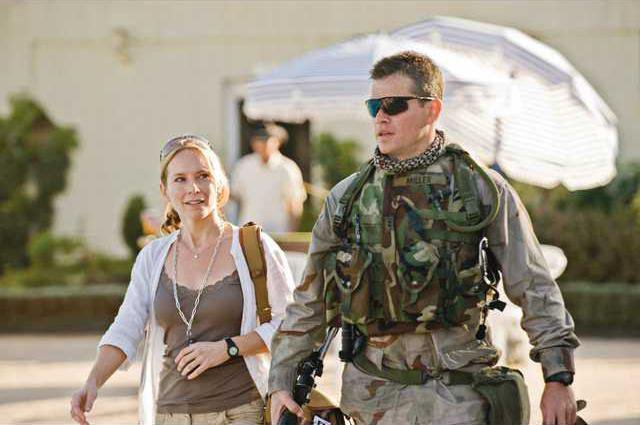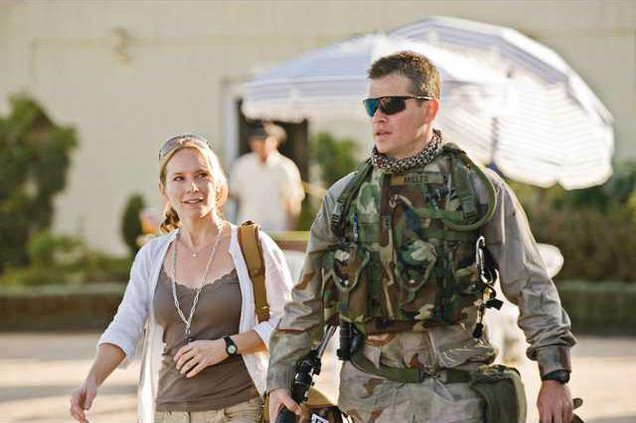Starring: Yigal Naor, Said Faraj, Faycal Attougui, Aymen Hamdouchi, Matt Damon, Nicoye Banks
Rated: R for violence and language
Running time: 115 minutes
Bottom line: Riveting, provocative action blockbuster
Director Paul Greengrass teamed up with Matt Damon for two of the past decade’s best action films, “The Bourne Supremacy” and “The Bourne Ultimatum.” Those movies achieved something rare by both satisfying critics and scoring huge at the box office.
“Green Zone,” with its constantly shaking camera, gritty texture and jarring editing, looks very much like those movies. But the film’s overt politics make it distinctly different from the mostly apolitical Bourne trilogy. Here, Greengrass clearly set out to indict Bush administration foreign policy and the American press.
It’s 2003, and Roy Miller (Damon) leads a military unit charged with finding weapons of mass destruction in Iraq. But each time his team investigates a supposed WMD storage site, the intelligence is bad and they find nothing. Understandably frustrated, Miller questions the intelligence sources to his commanders, who don’t take kindly to his insubordination.
All the faulty intelligence is funneled through Clark Poundstone (Greg Kinnear), a nonmilitary commander more concerned with manipulating the media than military strategy. He has been feeding information to Wall Street Journal reporter Lawrie Dayne (Amy Ryan), who reports on Poundstone’s intelligence without checking it against other sources.
Poundstone’s military operative is a secret forces soldier named Briggs (Jason Isaacs), who repeatedly thwarts Miller’s pursuit of the truth. By the way, Isaacs is better known as Lucius Malfoy. Here, he is almost unrecognizable with cropped brunette hair, a goatee and a perfect American accent.
Speaking of spot-on accents, Irishman Brendan Gleeson plays CIA operative Martin Brown, who shares Miller’s desire for truth and WMDs. The film eventually becomes a battle between Brown and Miller versus Poundstone and Briggs.
Miller is a true believer surrounded by opportunists. He genuinely wants to find weapons and saves lives, while everyone else is playing an angle.
The only other character whose intentions are as noble as Miller’s is an Iraqi civilian nicknamed Freddy (Khalid Abdalla). Freddy comes to Miller’s team with information and becomes a pawn in the American military’s infighting.
Damon commands the most attention, but Freddie might be the more important character. During one poignant scene, Freddie pleads with Miller to trust him. Freddie lost part of his leg in the Iraq-Iran war, and he loves his country so much he’s willing to help Miller hunt down the former top general in Hussein’s Republican Guard, even though some Iraqis might kill him for doing it.
Freddie is just as much a patriot as Miller, and he becomes the voice of the Iraqi people. Freddy is one of several elements that compensate for some glaring flaws in “Green Zone.”
Some find Greengrass’ style so dizzying it inspires seasickness. I like the Greengrass style, so if I could defend it I would. But even I have to admit that he goes too far in “Green Zone.” If anything, Greengrass pushes his visual style even further in the directions that some have criticized.
Several scenes were filmed at night and look so raw they’re difficult to see. We actually have to strain to make out all the shapes on screen. There’s no justifying it. When the images are unintelligible or just downright ugly, the style doesn’t work. I’m still going to be excited for Greengrass’ next film, but let’s hope he starts to rein it in.
“Green Zone” is also overtly, unquestionably political, which is good and bad. While it will offend some, it might spark constructive debate. It might even inspire people to seek out more even-handed, factual accounts of this period in American military and political history.
I’m willing to forgive the movie’s political posturing, too, because while Greengrass and screenwriter Brian Helgeland (“Bourne Supremacy,” “L.A. Confidential”) become self-righteous at times, they capture the essence of the conflict at others.
“Green Zone” offers the same thrilling action sequences as the Bourne trilogy but will no doubt divide viewers politically. But at a time when we’re already so divided, maybe this will provide more fodder for discussion.
Jeff Marker is a media studies professor at Gainesville State College.

